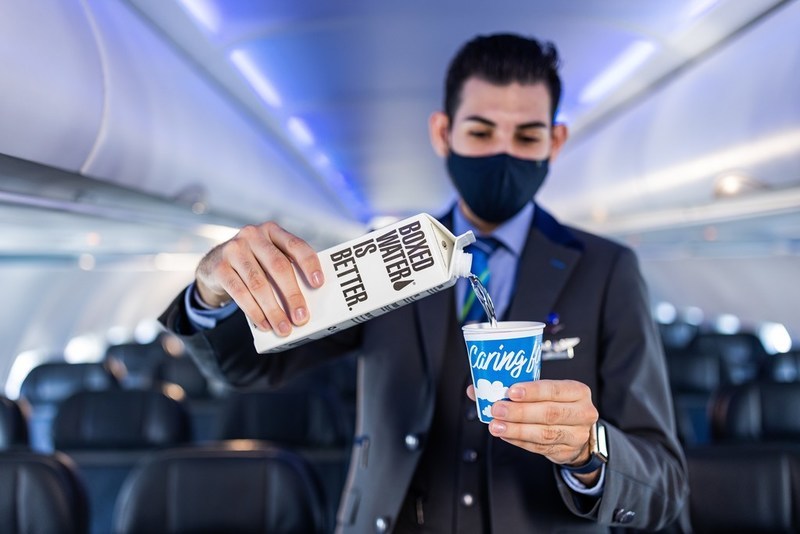Alaska Airlines’ inflight water service is getting a planet-friendly upgrade. Starting tomorrow (4th of Nov), the airline is trading plastic water bottles for Boxed Water Is Better® brand’s 92% plant-based cartons and swapping out plastic cups with recyclable paper cups for water service. This change saves an estimated 1.8 million pounds of single-use plastics from flights over the next year – equivalent to the weight of 18 Boeing 737s.
Inflight water service is the most significant contributor of onboard plastic waste. The switch to more sustainable solutions will effectively remove 22 million plastic cups and 32 million plastic bottles per year from Alaska flights.
“As a West Coast-based airline, we fly to some of the most beautiful places on earth. Protecting these habitats is critical for our collective future, and reducing plastic waste is a key step,” said Diana Birkett Rakow, vice president of public affairs and sustainability for Alaska Airlines. “We’re proud to partner with Boxed Water on our most impactful plastic-reduction initiative yet, on a continued journey to minimize inflight waste.”
“We are grateful to Alaska Airlines for leading the airline industry with bold steps toward plastic waste reduction,” noted Daryn Kuipers, CEO for Boxed Water. “Our ability to scale with Alaska from First Class to main cabin in just six months demonstrates both operational feasibility and the interest travelers have in more renewable inflight offerings.”
Alaska became the first airline to offer guests Boxed Water™ cartons inflight in early 2021 – introducing the renewable packaged water alternative in First Class and on Alaska’s Horizon Air-operated flights. The trial was a success with guests and employees, with surveyed fliers preferring Boxed Water over plastic bottled water at a rate of two-to-one.
“Only 9% of plastic is recycled nationwide1 – the rest ends up in landfills, burned or in our environment,” said Todd Traynor-Corey, managing director of guest products for Alaska Airlines. “Although we have an industry-leading recycling program, the reality is that we need to move to renewable options. Getting to this point hasn’t been easy. We investigated several options with our supply chain – and this year we finally found a product our guests love and a partner whose mission-driven values mirror our own.”
In identifying the most renewable packaged water option, our Green Team Employee Business Resource Group spent months researching and vetting package materials, water quality, life cycle analysis, production impacts, and recycling capabilities.
Boxed Water is a fully recyclable box-shaped carton of water, sealed with a plant-based cap. Boxed Water’s 100% pure water goes through a proprietary multi-step purification process, which includes reverse osmosis, carbon filtration, UV light and ozonation. The water is also pH neutral and free from additives.
Adoption of Boxed Water is part of Alaska’s continued leadership in inflight waste reduction, from onboard recycling to being the first airline to eliminate plastic straws and stir sticks in 2018. The airline invites flyers to use airport water stations and #FillBeforeYouFly, as part of an initiative to avoid using single-use packaging at all, and offsets its water consumption with local habitat restoration projects managed by its partner Bonneville Environmental Foundation (BEF).
Plastic-free water service is one of many new, planet-friendly initiatives guests will notice on Alaska flights. Alaska has eliminated hundreds of single-use waste items and pioneered fresh food for pre-order using industry-leading technology to ensure that guests can get exactly what they want. Offering fresh food for purchase via pre-order has dramatically decreased the food waste that was experienced pre-COVID. Beginning Nov. 4, Alaska will add more food options for guests via its industry leading pre-order technology.
Significantly reducing inflight waste is one of Alaska’s sustainability goals for carbon, waste, and water. Earlier in 2021, Alaska announced a strategy to achieve net zero carbon emissions by 2040, with near-term 2025 targets to be the most fuel-efficient U.S. airline by 2025, and to cut climate emissions from ground equipment in half.
Share this content:
This post was published on 4 November 2021 8:40 am

